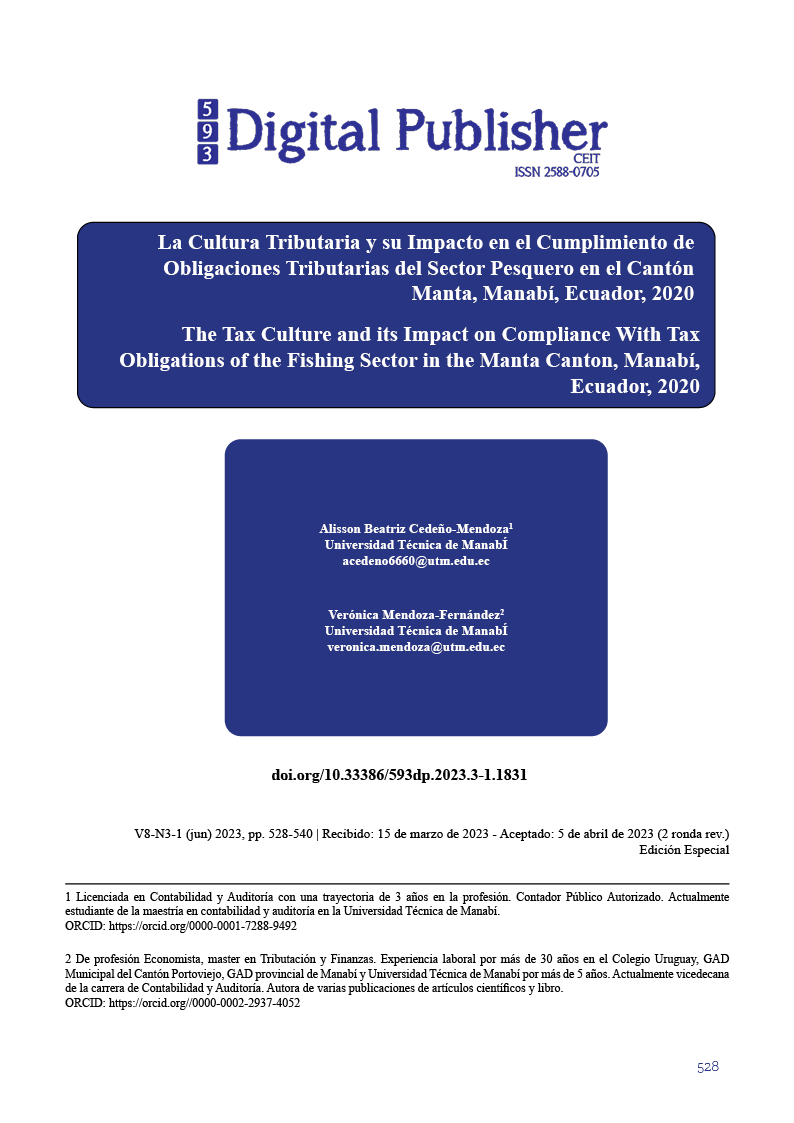The tax culture and its impact on compliance with tax obligations of the fishing sector in the Manta canton, Manabí, Ecuador, 2020
Main Article Content
Abstract
The importance of this study lies in recognizing the tax culture as a promoter of education regarding tax compliance issues, due to the bad tax actions by taxpayers in this industry. The purpose of this research was to analyze the impact of the tax culture on compliance with tax obligations of the fishing sector of the Manta canton. The methodology used has a mixed or quantitative-qualitative approach, where information gathering techniques such as interviews and surveys are applied, the scope was descriptive because the reality of the situation in the Manta fishing sector is described. The companies Seafman S.A. were taken as the object of study. and Pescapeces S.A., considered two prestigious fishing companies in the city and with the highest tariff contribution. The results obtained indicate the relevance of continuing with proposals for tax acculturation in these fishing companies, where the importance of having departments that are in charge of tax management, constant training for company personnel in the face of changes by the administration, is recognized. for proper compliance with tax obligations and considers the situations that put said compliance at risk. The tax culture is the best way to contribute to a society characterized by tax mismanagement and tax evasion, where it is necessary to intensify control and monitoring of large and small fishing industries to ensure correct tax application in their tax procedures.
Downloads
Article Details

This work is licensed under a Creative Commons Attribution-NonCommercial-ShareAlike 4.0 International License.
1. Derechos de autor
Las obras que se publican en 593 Digital Publisher CEIT están sujetas a los siguientes términos:
1.1. 593 Digital Publisher CEIT, conserva los derechos patrimoniales (copyright) de las obras publicadas, favorece y permite la reutilización de las mismas bajo la licencia Licencia Creative Commons 4.0 de Reconocimiento-NoComercial-CompartirIgual 4.0, por lo cual se pueden copiar, usar, difundir, transmitir y exponer públicamente, siempre que:
1.1.a. Se cite la autoría y fuente original de su publicación (revista, editorial, URL).
1.1.b. No se usen para fines comerciales u onerosos.
1.1.c. Se mencione la existencia y especificaciones de esta licencia de uso.
References
Andrade, M., & Cevallos, K. (2020). Cultura tributaria en el Ecuador y sostenibilidad fiscal. Revista Eruditus, 1(1), 49-62. https://doi.org/10.35290/re.v1n1.2020.290
Arias, k., Carrillo, P., & Torres, J. (2020). Análisis del sector informal y discusiones sobre la regulación del trabajo. División de Desarrollo Económico. Santiago: Comisión Económica para América Latina y el Caribe (CEPAL). https://repositorio.cepal.org/handle/11362/45866
Barcia, D., & Sánchez, A. (2019). La cultura tributaria y su incidencia en la informalidad de la actividad pesquera en la actividad pesquera en la provincia de Manabí. Universidad Católica de Santiago de Guayaquil. http://repositorio.ucsg.edu.ec/handle/3317/13633
Cabrera, M., Sánchez, M., Cachay, L., & Rosas, C. (2021). Cultura tributaria y su relación con la evasión fiscal en Perú. Revista digital de Ciencias Sociales, 27(3), 204-218. https://www.redalyc.org/journal/280/28068276018/html/
Castro, A. (2021). Tecnología y conocimiento, una combinación efectiva en el control de la evasión de impuestos en Ecuador (1997 – 2020). Revista Digital FLACSO Ecuador, 20-36. http://hdl.handle.net/10469/17378
Corona, J. (2016). Apuntes sobre métodos de investigación. Revista Electrónica Medisur, 14(1), 87–88. http://scielo.sld.cu/scielo.php?script=sci_arttext&pid=S1727-897X201600010001
Días, J., Cruz, B., & Castillo, N. (2016). Tax Culture. Revista Publicando, 3(9), 697-706. https://revistapublicando.org/revista/index.php/crv/article/view/403/pdf_249
Herrera, M., Casanova, I., Silva, G., & Parraga, P. (2021). Tax Culture through accounting training for small and medium-sized. Journal of Business and entrepreneurial studies, 1(1), 1-17. doi:https://doi.org/10.37956/jbes.v4i2.84
Mariott, M., & Zambrano, M. (2020). El Régimen Impositivo Simplificado Ecuatoriano (RISE) y su incidencia en la recaudación tributaria en Manabí durante el periodo 2014 – 2018. Revista digital Polo del conocimiento, 5(5). https://polodelconocimiento.com/ojs/index.php/es/article/view/1412
Mendieta, P. (2018). La educación como apoyo en el Fortalecimiento de la cultura Tributaria. Caso: NAF-UCACUE. INNOVA Research Journal, 3(12), 148–158. https://doi.org/10.33890/innova.v3.n12.2018.838
Ministerio de Transporte y obras Públicas. (2018). RECONSTRUCCIÓN Y AMPLIACIÓN DEL TERMINAL PESQUERO Y CABOTAJE DE LA CIUDAD DE MANTA, PROVINCIA DE MANABÍ. Proyecto de Inversión , Manta.
Moreira, H. (2018). La cultura tributaria y su incidencia en el cumplimiento de las obligaciones tributarias de los comerciantes de la Sociedad Abastecedora del Mercado Central de Jipijapa. Universidad Estatal del Sur de Manabí, 21-37. http://repositorio.unesum.edu.ec/handle/53000/1513
Palma, A., Plúa, K., & Cedeño, J. (2022). Tax culture and its impact on compliance with tax obligations Quevedo, 2022. LATAM Revista Latinoamericana de Ciencias Sociales yHumanidades, 3(2), 1433–1450. https://doi.org/10.56712/latam.v3i2.193
Pirela, A. (2022). INFLUENCIA DE LA EDUCACIÓN UNIVERSITARIA EN LA FORMACIÓN DE LA CULTURA TRIBUTARIA DEL CONTADOR PÚBLICO. Revista Científica Visión de Futuro, 26(1), 1-21. https://doi.org/10.36995/j.visiondefuturo.2021.26.01.001.es
Ponce, C., Pinargote, A., Chiquito, G., Baque, E., Quiñonez, M., Campozano, G., & Salazar, M. (2018). Desconocimiento de obligaciones tributarias y su incidencia en el Impuesto a la Renta. Revista científica Dominio de las ciencias, 4(3), 394-312. doi:http://dx.doi.org/10.23857/dom.cien.pocaip.2018.vol.4.n.3.294-312
Rojas, M. (2016). Tipos de Investigación científica: Una simplificación de la complicada incoherente nomenclatura y clasificación. Revista Electrónica REDVET, Vol. 16(1), P. 1-14. http://www.veterinaria.org/revistas/redvet/n010115.html
Ruperti, J., Zambrano, G., Fernández, V., López, M., & Machuca, P. (2020). EL EMPRENDIMIENTO Y PROMOCIÓN DE LA ACTIVIDAD PESQUERA EN EL CANTÓN MANTA. Revista Científica Multidisciplinaria Mikarimin, 6(1), p. 25. http://45.238.216.13/ojs/index.php/mikarimin/article/view/1932/1238
Santillán, M. (2022). Cultura tributaria en los comerciantes del mercado La Condamine de la ciudad de Riobamba (Ecuador). Revista Apuntes contables, 30(1), 101-112. doi:https://doi.org/10.18601/16577175.n30.07
Singuenza, S., Sandoval, S., Viscaino, A., Giron, E., Erazo, S., & Jimbo, L. (2020). Fiscal policy and its impact on the tax culture of Ecuador. Revista Espacios, 41(47), 161-175. doi:DOI: 10.48082/espacios-a20v41n47p12
Yagual, C. (2020). Cultura tributaria y su incidencia en el cumplimiento de las obligaciones tributarias en el sector pesquero. Revista de la Universidad Estatal Península de Santa Elena, 1(1), 1-16. https://repositorio.upse.edu.ec/handle/46000/5810
Yugcha, G. (2020). Importancia de la Cultura Tributaria en Ecuador. Revista de la Universidad Estatal Península de Santa Elena, 1(1), 7. https://repositorio.upse.edu.ec/handle/46000/5533



